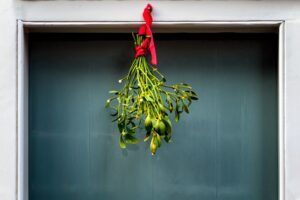 When we think of mistletoe during the holiday season, most people will think of a dainty green twig with snow white berries and a red ribbon hung above a doorway. The tradition of mistletoe says that if you are caught standing underneath the doorway where this plant hangs, you should be ready for a kiss from a loved one.
When we think of mistletoe during the holiday season, most people will think of a dainty green twig with snow white berries and a red ribbon hung above a doorway. The tradition of mistletoe says that if you are caught standing underneath the doorway where this plant hangs, you should be ready for a kiss from a loved one.
Mistletoe is a real, parasitic plant that is found in Colorado. When you hear parasitic, you might think, “That is a lot less romantic than the mistletoe I know,” and you are right. In Colorado, we have dwarf mistletoes (Arceuthobium species) and Juniper mistletoe (Phoradendron juniperinum). Both types are parasitic, they infect and damage many of our evergreen tree species.
Mistletoes produce root like structures that grow into the wood of their host tree and suck out nutrients and water. Over time this will reduce the health of the tree and can eventually lead to premature death. Mistletoe fruits explosively shoot their seeds at a speed of up to 60 MPH, at which time they stick to whatever surface they touch (most likely another branch of a tree). Management methods include pruning infected branches or removing an infected tree. There are some species that are resistant to mistletoe and might be considered when planting a tree in an area where known mistletoe infections have occurred.
So why do we kiss under a plant with such a dark side? The exact roots are not known, but many cultures have had beliefs about mistletoe for centuries. Since the plant bears fruit in the winter, it has long been associated with fertility by many cultures. Celtic Druids worshipped mistletoe that grew on oaks, their sacred tree. They believed when the oaks lost their leaves in the fall, the spirit of the tree passed into the mistletoe, only to return to the oak the next spring.
Since ancient times, enemies who found themselves under a mistletoe infected tree would call a truce for the time being. Friends who found themselves under a mistletoe would find it to be good luck. Kissing under the mistletoe seems to have begun in England and spread throughout the world.
To “wrap” it up, mistletoe is a holiday plant with a warm and fuzzy tradition, but a definite dark side as well.
[photo courtesy paul-zoetemeijer – unsplash]
